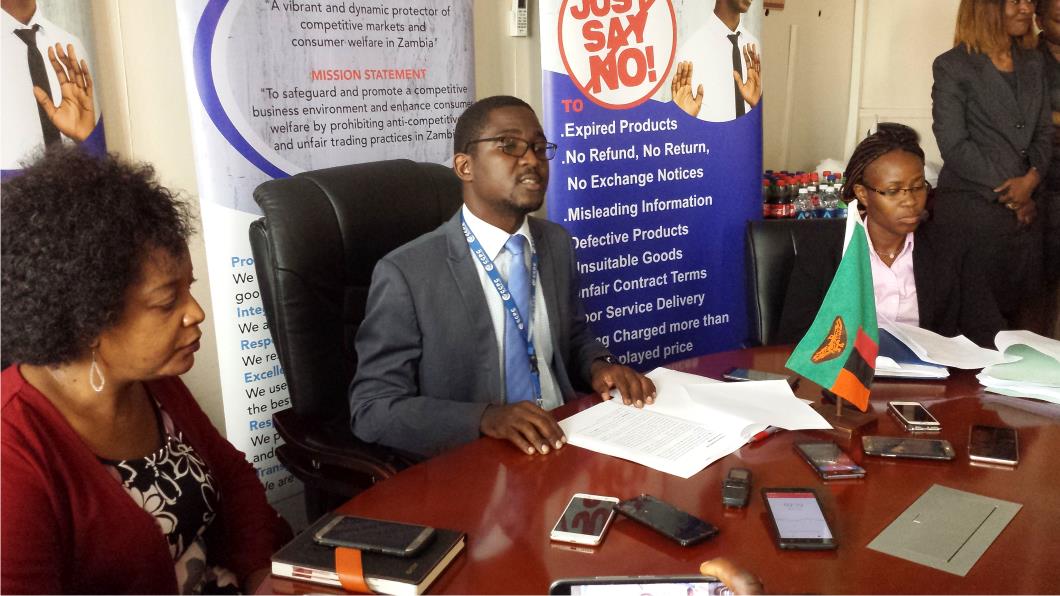The Fight Against Corruption in Zambia 2019 End of Year Media Brief
Notice: Undefined index: catFilterList in /home/zambi/public_html/wp-content/plugins/wp-likes/api.php on line 243
By Dorothy Mwanza
ACTING PUBLIC RELATIONS MANAGER
ANTI-CORRUPTION COMMISSION (ACC)
THIS brief covers the activities of the Anti-Corruption Commission during the year 2019. During the year, the Commission in line with the Strategic Plan 2017-2021 continued it its pursuit of ending corruption in the country by implementing new and effective strategies. The commission also continued to engage different stakeholders, in order to put in mechanisms to curb corruption within selected institutions.
Some public and private bodies, institutions of learning, local authorities, among others have embraced the National Integrity Program and are using it to strengthen their internal control systems and tackle opportunities for corruption and related crimes so that these are curtailed. The development of service charters, codes of ethics, and gift policies are some of the ways in which institutions are making the delivery of services to the public more efficient and transparent.
On the part of enforcement, the Commission continued to pursue corruption complaints and allegations to their logical conclusion, with offenders being investigated, arrested and prosecuted. The Commission will therefore not relent in pursuing corrupt elements in society and will endeavor to ensure that public resources are protected from selfish individuals, and where such resources have been stolen, every legal avenue available will be instituted to recover these resources and return them to the Zambian people.
Commission Activities in 2019
Ladies and Gentlemen
Allow me to give you an overview of the Commission’s activities in the year ended 2019.
The Commission continued to implement programmes aimed at preventing the occurrence of corruption at various levels of interaction between service seekers and providers. The Commission continued with the review process of the National Anti-Corruption Policy and Implementation Plan.
The corruption prevention programmes conducted during the year included training of integrity committee members from different public and private institutions on how to design and implement anti-corruption programs in their respective institutions. The institutions that benefitted from the training included Chipata General Hospital, Eastern Provincial Health Office, Chipata District Heath Office, Kafue Town Council, Local Authorities Superannuation Fund (LASF), Rural Electrification Authority (REA), ZESCO Ltd, Energy Regulation Board (ERB), Development Bank of Zambia (DBZ) and Zambia National Building Society (ZNBS). Others were Mpongwe, Luanshya, Lufwanyama, Ndola and Kitwe Councils, Zambia Information and Communication Technology Authority (ZICTA), Ministry of Water Development Sanitation and Environmental Protection, Ministry of Justice, University Teaching Hospitals (UTH) Women and Newborn, Eye, and Adult Hospitals, National Council for Construction (NCC), Zambia National Broadcasting Corporation (ZNBC), National Pension Scheme Authority (NAPSA) and Zambia Revenue Authority (ZRA).
In the quest to improve service delivery among public institutions, the Commission helped Public Service Pension Fund (PSPF) to develop the institutional anti-corruption policy, Ministry of Transport and Communication and Lusaka Water to develop the gift policy, and conflict of interest documents. Solwezi Municipal Council was helped to develop a draft Code of ethics and Gift Policy. The Commission also helped Zambia Credit Guarantee Scheme Limited (a public company under the Ministry of Finance) to develop the whistleblower policy.
The Commission sensitized Seventy (70) members of staff for Zambia Information and Communications Technology Authority (ZICTA) Integrity Committee (IC) for managerial staff aimed at enhancing knowledge and skills in Business Ethics and corporate governance to appreciate their role in upholding and maintaining high levels of ethical conduct. The Commission in conjunction with Transparency International Zambia sensitized more than 1600 Zambia Police recruits at Lilayi, Sondela and Kamfinsa in order to equip the recruits with knowledge on corruption and its effects, transparency and accountability. The Commission also sensitized 234 cashiers and examiners at Road Transport and Safety Agency to equip them with knowledge on corruption, ethics and integrity.
Other Corruption Prevention Exercises (CPE) were conducted in collaboration with public bodies with the view to reducing incidences of corruption. For instance, an exercise was conducted at the Sheriff of Zambia Office regarding guidelines for conducting auction sales and willful failure to comply with procedures in the auction of machinery. Another exercise was conducted at ZNBC regarding the way reporters are assigned duties in the newsroom. The other exercise was conducted at Kalomo Town Council, Central Veterinary Research Institute (CVRI) in the manner officials allocated land to themselves and non-CVRI employees and willful failure to comply with procedures in the allocation of plots. A CPE was also conducted in the manner the bursaries committee has been administering affairs of the committee as revealed in the Auditor General’s reports. The CPEs were successfully executed and recommendations made on how best these institutions can reduce incidences of corruption.
The Commission also implemented various outreach programs through its public education function aimed at equipping as many members of the public as possible with information on corruption to enable them to participate in the fight against corruption. These corruption awareness programs included lectures, shows and exhibitions, training workshops and public rallies. The Commission also continued to form and support anti-corruption clubs in schools across the country, distributed anti-corruption supplementary books in schools and other Information Education Communication materials (IECs). Over 167, 500 people were directly reached through these activities, covering a total of 48 constituencies. Further, over 162, 200 people were reached through media programmes countrywide.
During the year 2019, the Commission also received a total of 745 reports of suspected corruption. Out of these reports received, a total of 402 were non- corruption related. Therefore, advice was subsequently provided to all those that brought these reports on how best to pursue the matters complained of as they were outside the Commission’s mandate.
Of the 745 cases received, 343 reports contained elements of corruption and 202 reports were authorized for investigations while Four (4) were recommended for Corruption Prevention interventions. Some reports did not have sufficient details of the corruption offence to warrant investigations to be conducted. There were 137 such cases which were subsequently referred to relevant institutions for administrative action. Out of the remaining cases, some were closed with no further action due to insufficient information, while others are still being studied to determine the next course of action. The complainants in these matters were also advised accordingly.
In addition, the Commission concluded and closed a total of 75 investigation cases. The Commission also recorded thirty-eight (38) arrests. At the close of the year, there were a total of 758 cases under investigations.
Cases from the Financial Intelligence Centre Report:
The Commission has also continued to investigate cases of suspected corruption arising from information received from the Financial Intelligence Centre (FIC). As you may be aware, the Commission and the FIC collaborate through a signed Memorandum of Understanding which provides for sharing of information between the two institutions. Arising from information received from the FIC, Investigations were instituted into five (5) cases from 2018, and an additional three (3) cases from 2019.
Ladies and Gentlemen
Allow me to give you an update on the progress made so far. From the five (5) FIC cases that the Commission instituted investigations in 2018, the progress is that; one (1) case is in court, two (2) cases are still under investigations, one (1) case has been determined by the court and one (1) case has been closed due to insufficient evidence.
Then from the three (3) FIC cases received in 2019, the progress is that; one (1) case has been concluded and is in court and two (2) cases are still under investigations.
Conclusion
I would like to reaffirm the Commission’s commitment to the fight against corruption and safeguarding our country’s public resources. The Commission will continue to pursue corruption complaints and allegations to their logical conclusion, with offenders being investigated, arrested and prosecuted. The Commission will not relax until all perpetrators of corruption are brought to book and all stolen assets given back to the Zambian people.
Therefore, the Commission calls upon all stakeholders to come to the fore and work in partnership with the ACC to effectively combat the corruption scourge. Let us all embrace the national anti-corruption slogan “A Corruption free Zambia Begins with Me.” The Commission remains open and ready to work with various stakeholders both in the public and private sector in the campaign towards a corruption-free Zambia.
I thank you.
Dorothy Mwanza
ACTING PUBLIC RELATIONS MANAGER





















